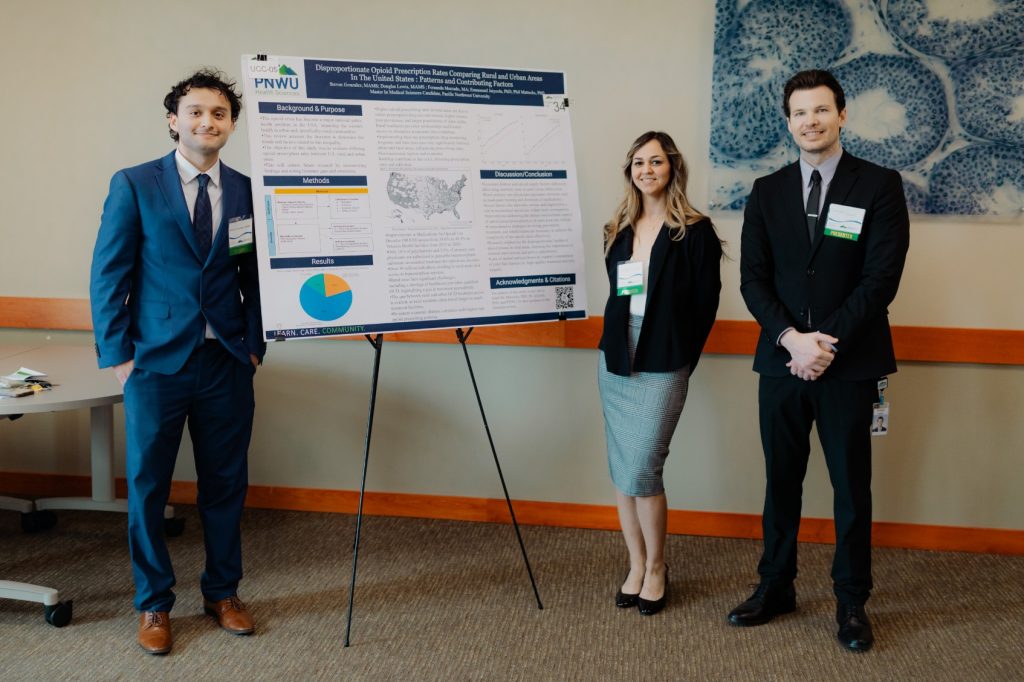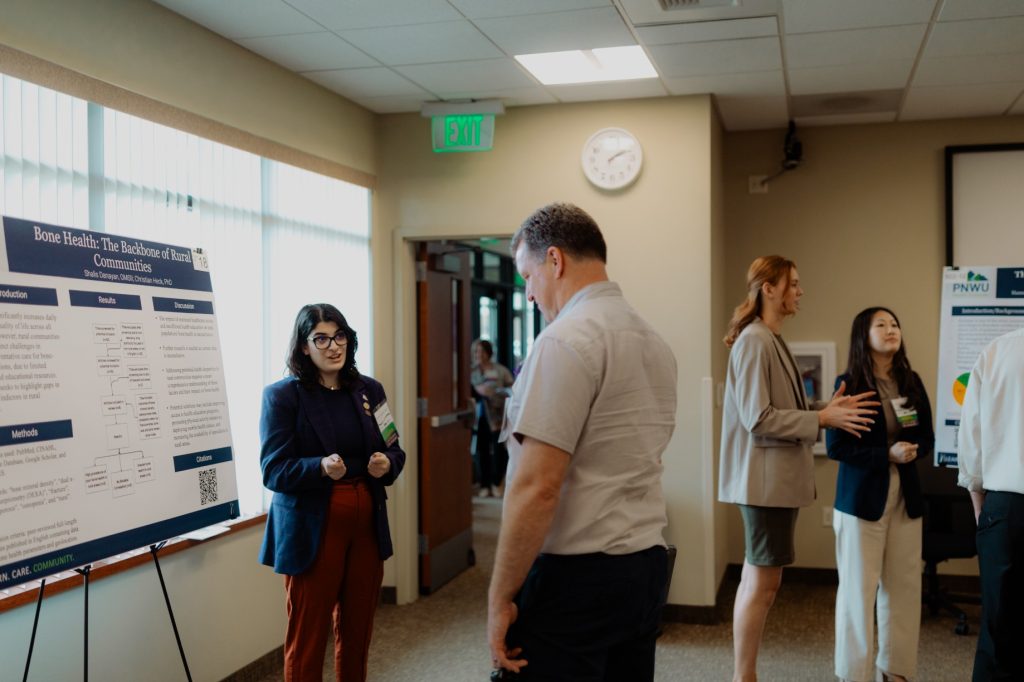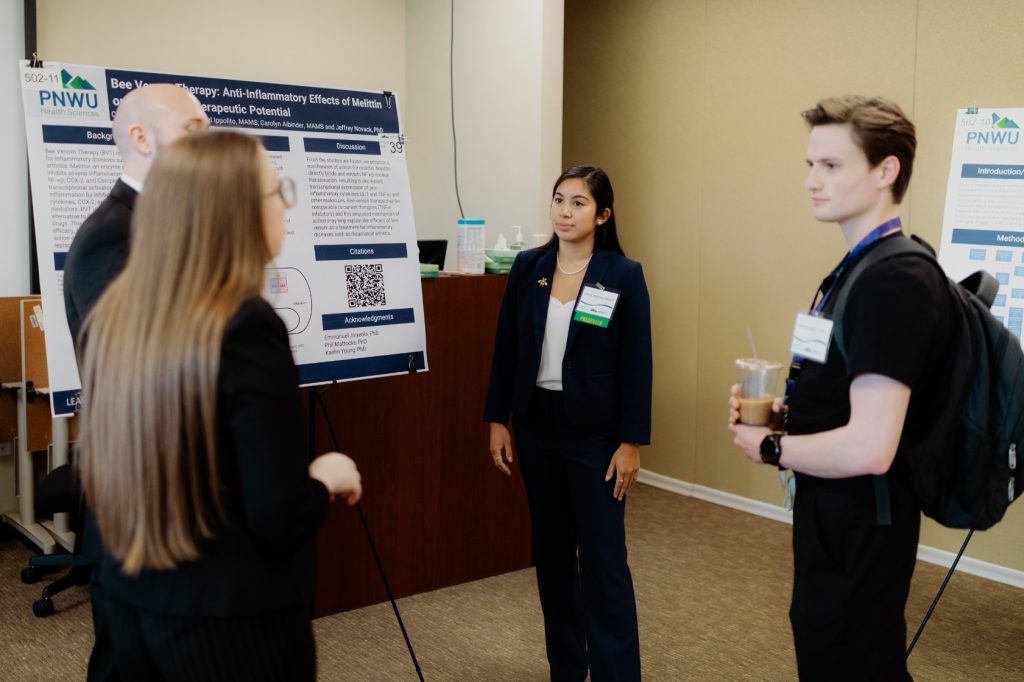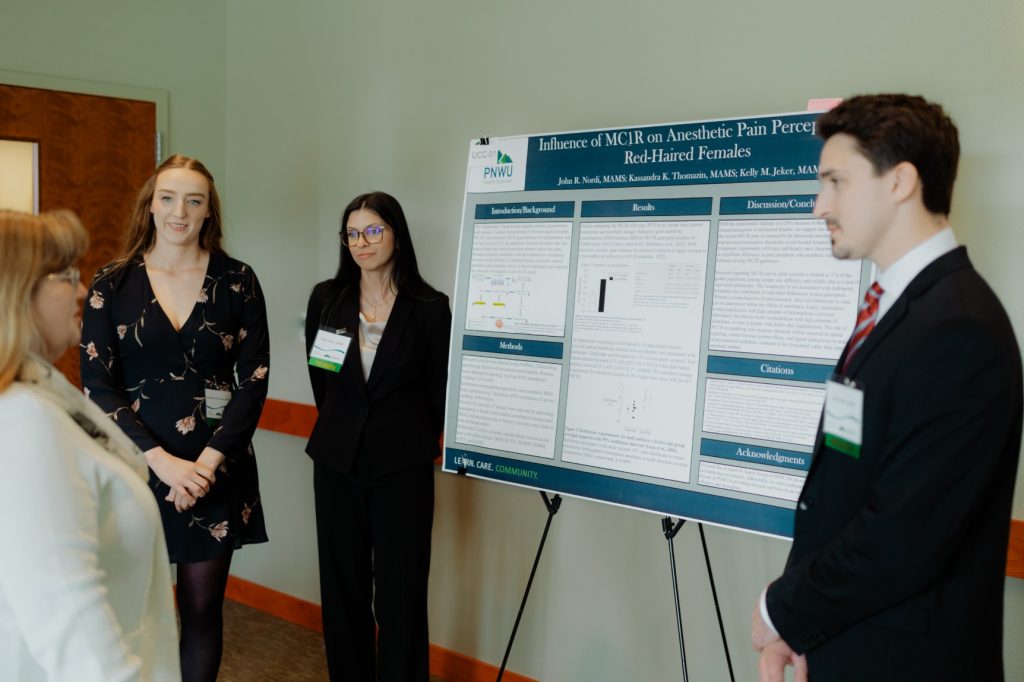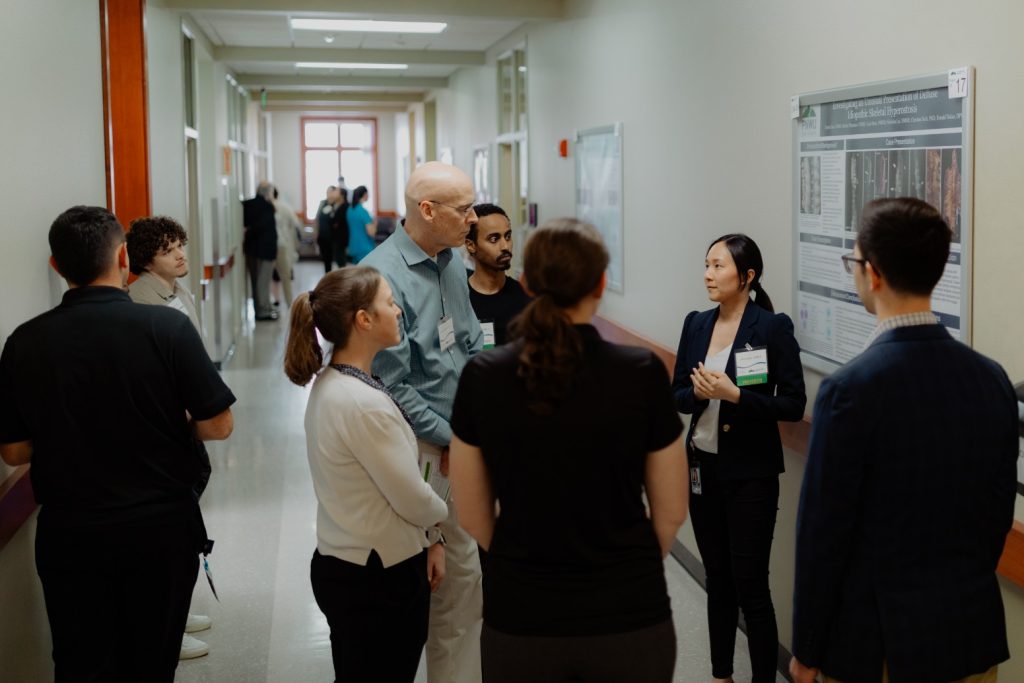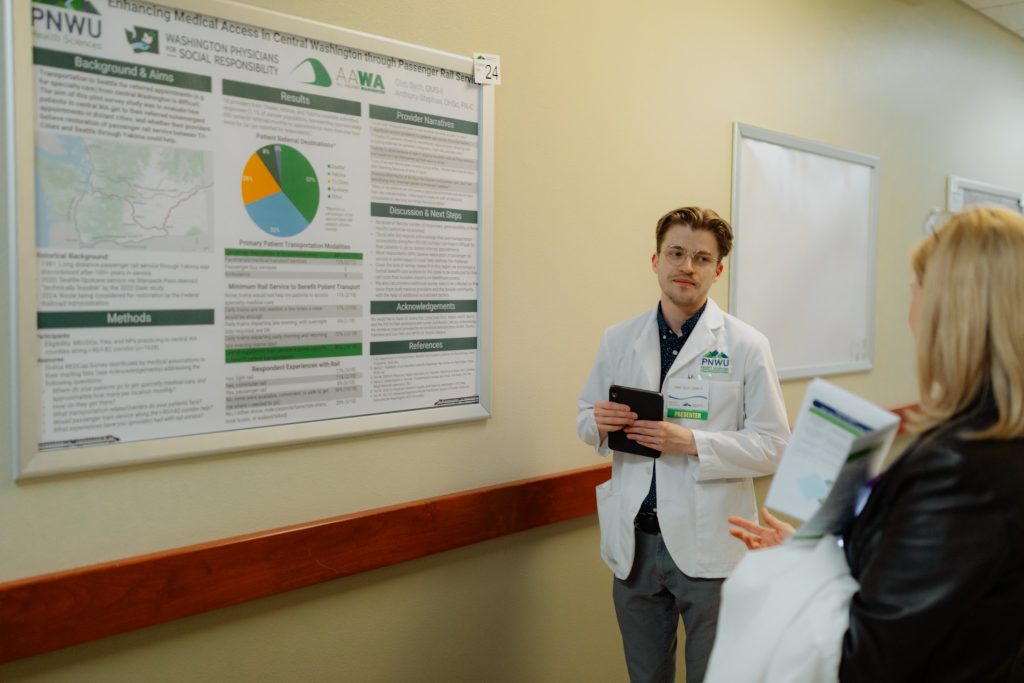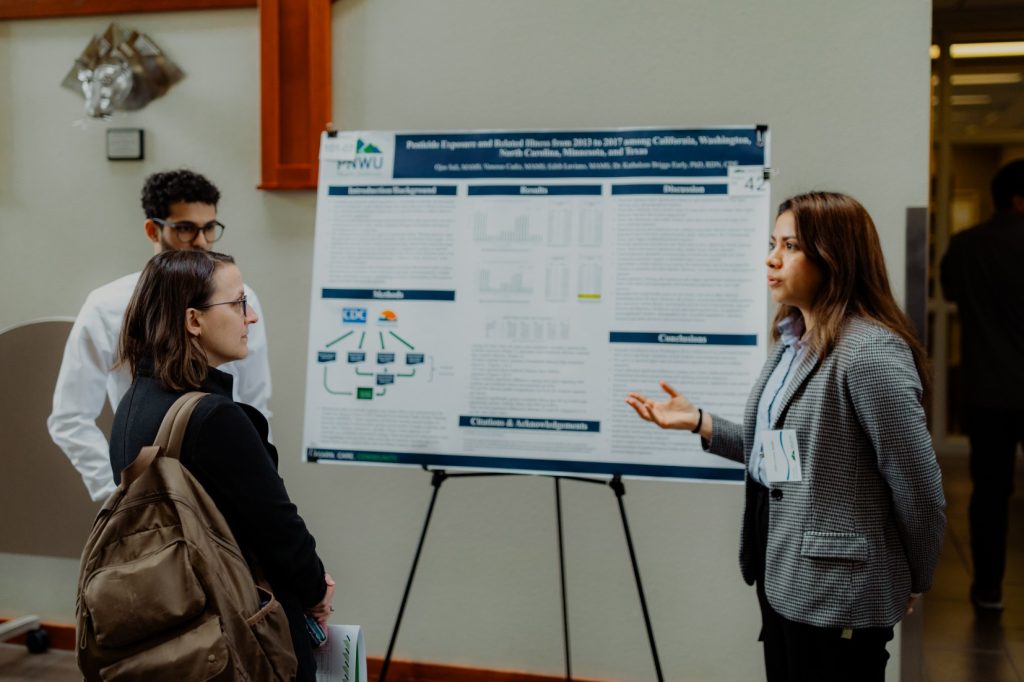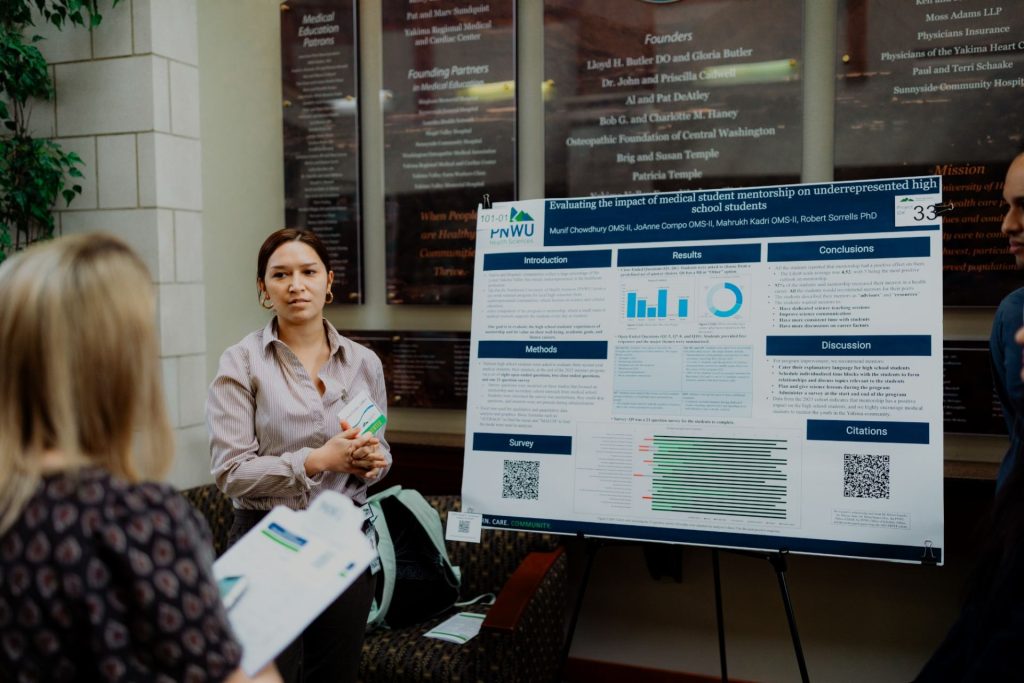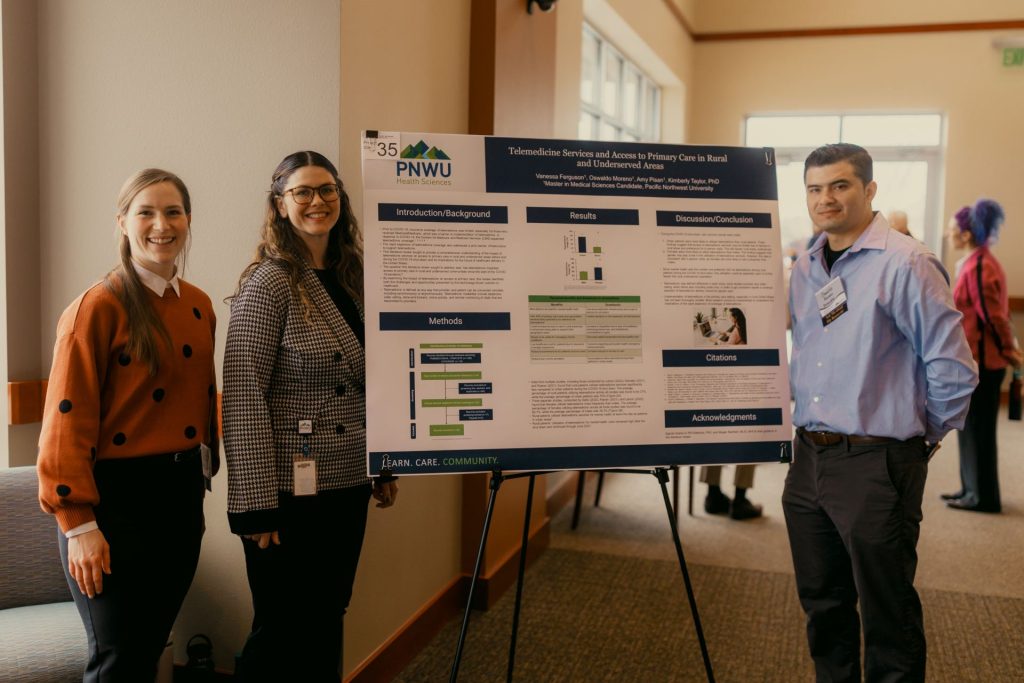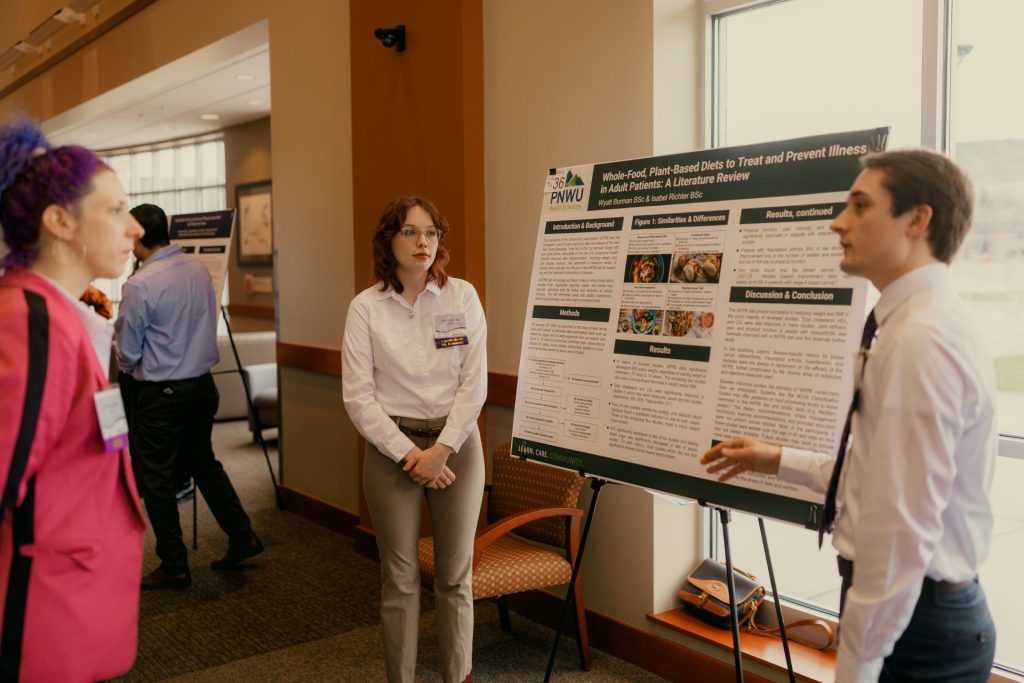The PNWU Research Symposium is a showcase of research, innovation, and improvement in health and health sciences. Join us for an afternoon of exploration as faculty, students, and other research professionals from various health science fields present their latest findings via keynote presentations, scientific posters, and lightning talks. This event is free and registration is required.

Join us for the 2025 PNWU Research Symposium!
- Check-in: 11:30 AM-12 PM, BHH Foyer/Commons
- Introduction: 12-12:15 PM, BHH 302
- Keynote Speaker and Lunch: 12:15-1:15 PM, BHH 302
- Break: 1:15-1:30 PM
- Poster Hall: 1:30-3:30 PM, BHH & UCC
- Break: 3:30-3:45 PM
- Lightning Talks: 3:45-4:15 PM, BHH 302
- Research Updates: 4:15-4:45 PM, BHH 302
- Awards: 4:45-5 PM, BHH 302
Registration is open!
One form per person please.
If you will be bringing family members or friends, please fill out one form for yourself and send an email to osa@pnwu.edu with the total number of non-PNWU-affiliated people attending.
Keynote Speaker

Tracy Jirikowic, PhD, OTR/L, FAOTA
Tracy Jirikowic has over 30 years experience in occupational therapy with expertise in pediatric neurodevelopment and interventions for children and youth with developmental disabilities. Dr. Jirikowic has special research and clinical interests in fetal alcohol spectrum disorders (FASD) and holds a clinical appointment with the University of Washington Fetal Alcohol Syndrome Diagnostic and Prevention Network. Her research activities include development of an early identification and intervention model for children with FASD, understanding sensory processing in children with FASD, and examining community-based interventions that promote social participation, health, and well-being for individuals with intellectual and developmental disabilities. She also holds a current appointment as Co-Director for the PhD in Rehabilitation Science Program in the UW Department of Rehabilitation Medicine.
Keynote Topic:
Supporting Children with Prenatal Substance Exposure and their Families: Perspectives and Pathways for Promoting Strengths and Resilience
In this keynote address, Dr. Jirikowic will highlight prominent developmental needs of children impacted by prenatal alcohol and substance exposure and responsive interventions that support children and their caregivers. Current and emerging evidence-based approaches will be described that include elements of FASD-informed care and child and family-centered strategies that promote early intervention, positive behavior support and community participation.
2025 Timeline – Students

Resources
Symposium Categories
The PNWU Research Symposium features projects in four categories: Empirical Research, Quality Improvement, Case Reports, and Literature Reviews. Below are descriptions of each to help you determine where your project fits.
Empirical Research involves the collection and analysis of data to answer research questions or test hypotheses. Empirical research is grounded in real-world observations and aims to contribute new knowledge to a particular field through systematic and objective methods that allow for reproducibility.
Quality Improvement involves identifying areas for improvement, implementing changes, and continuously monitoring and assessing the impact of those changes to achieve better results. Quality improvement happens most often in clinical settings and is usually driven by a problem statement, rather than a research question or hypothesis. While quality improvement aims to be systematic, it is much more flexible than empirical research and allows investigators to make changes to the protocol as the project unfolds. As such, quality improvement projects are more difficult to replicate.
A Case Report is a detailed and specific description of an individual case, often in the fields of medicine, psychology, or social sciences. It typically presents information about a patient, client, or subject, including their medical history, symptoms, diagnosis, treatment, and outcomes. Case reports are valuable for documenting unusual or unique cases and can provide insights into diagnosis and treatment approaches. The PNWU Library has digital copies of Writing Case Reports: A Practical Guide from Conception Through Publication available.
A Literature Review is a critical and systematic analysis of existing research and scholarly literature on a specific topic. It involves identifying, evaluating, and synthesizing relevant studies, articles, and other sources to provide a comprehensive overview of the current state of knowledge on the chosen subject. The PNWU Library has digital copies of Judith Garrard’s Health Sciences Literature Reviews Made Easy which is a great resource for learning about literature reviews.
Abstract Submission Requirements
The abstract submission form requires the following information:
- Title of your project
- Contact information
- Names of all authors and their credentials
- Primary faculty mentor name
- Contact information for the submitting author and primary faculty mentor
- Type of project
- Select from the following four categories:
- Empirical research
- Quality improvement
- Literature or other type of review
- Case study or case series
- Select from the following four categories:
- Abstract
- 350 word maximum
- Abstracts for empirical research, quality improvement, and literature reviews must include the following sections:
- Introduction
- Methods
- Results
- Discussion
- Abstracts for case reports must include the following sections:
- Introduction
- Case Description
- Discussion
- Proof of IRB Approval for projects involving human subjects or their data
- Empirical Research and Quality Improvement projects not involving human subjects or identifiable data MUST seek a formal Determination of Not Human Subjects Research (NHSR)
- IRB Approval or Determinations of NHSR must be obtained BEFORE you interact with humans or access their data
- IRB Workshop Video
Abstract Judging Rubrics
Look through the judges’ rubrics to learn more about scoring elements.
Resources for Developing Abstracts
- PNWU Library’s ‘How to Write an Abstract’ module in Moodle
- Lizzie Lamb’s 2025 PowerPoint on the ‘Introduction to the Research Symposium’
- Dr. Diana Rhodes’ 15-minute presentation, ‘How to Write an Abstract‘
- Introduction to the Symposium
Read through programs, abstracts, and award winners from previous PNWU Research Symposia here.
Resources for Developing Posters
- Poster template for Empirical Research and Quality Improvement Projects
- Poster template for Case Reports
- Poster template for Literature Reviews
- Developing a Poster Presentation Seminar by Dr. Briggs Early and Dr. Habecker – Recording (requires PNWU login)
- Developing a Poster Presentation Seminar by Dr. Briggs Early and Dr. Habecker – PDF Handout
- Poster judging rubric
Information for Presenters
- Please send your poster to your faculty mentor to review by Tuesday, March 11, 2025.
- Posters are due to OSA by 11:59 PM on Tuesday, March 18, 2025 via the REDCap link provided in an email from OSA. This link is unique to your project. Please email osa@pnwu.edu if you need us to re-send you your link. We will not accept posters after this time, nor will we accept changes to posters after they are submitted.
- Posters must be submitted as a PowerPoint slide in .jpg format.
- External presenters are welcome to use the below templates.
- External presenters may use their organization’s logo.
- You can alter templates or use different ones, but they must fit the size requirement of 36″ X 48″
- Templates
2025 Timeline – Full





